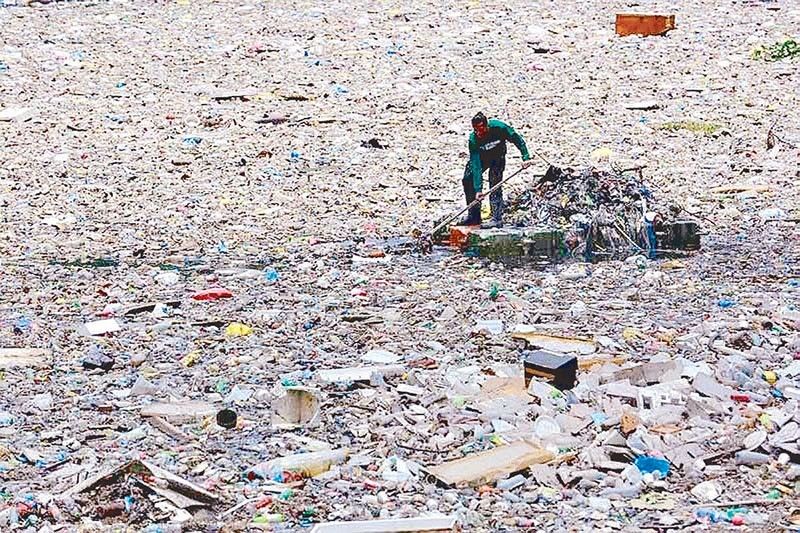Solutions abound for tackling plastic waste

MANILA, Philippines — Sachets used in the Philippines can cover the entire Metro Manila one-foot deep in plastic waste, or about one million metric tons.
Indeed, the Philippines, being the third plastic polluter of the world, contributes 0.75 million metric tons into the oceans each year – thereby choking marine biodiversity.
It is now on the verge of awakening to this sad reality and compelling manufacturers of single-use plastics, particularly sachets, to join the bandwagon in reversing this catastrophic trend.
Even dumpsters and junkyards that previously bought those plastic bottles, basins and so-called recyclable table wares, are now refusing to pay big for such materials that now sadly cost only P1 a kilo. Thus, consumers and former trash collectors would rather leave them to garbage trucks that hurl them into open dump sites, which when strong rains occur, are carried by floodwaters to rivers, lakes and seas.
The Philippines also recently allowed rich and industrialized foreign countries to export their garbage to the country, making the Global North partly to blame for such plastic pollution.
There are attempts by Congress to penalize plastic polluters and require manufacturers’ of single-use plastic to share the cost of the impact of their products (through the Extended Producer Responsibility clause). There are also local governments banning the use of single-use plastics by wet and dry market merchants. These are just among the small steps to control plastic pollution on the supply side.
Alternative products
But the demand side is finding ways to develop such polluting plastics into alternative products like cement for civil works (of government projects) and buildings, multi-colored but paintable eco-boards for homes, schools and other structures and even reusing the PET bottles as containers of shampoos, dishwashing and liquid laundry soaps, disinfectants, tote bags, aprons and other uses like the Ateneo de Manila Institute of Sustainability reported doing in 2022.
Plastic bottles can’t be recycled or reused for drinking or reheating because the chemicals and toxic substances in microplastics pose danger to human health, when ingested or inhaled, wrote former Senator Orlando Mercado in his column, as he cited new studies showing that even human placenta may already contain traces of microplastics that risk babies’ health in the womb.
Scientists said polyethylene — a common plastic used to make plastic bags and bottles — has been detected in 62 placental tissue samples collected. These tiny plastics were also detected in human blood, breast milk and the lungs. The reality of having microplastics in our bodies is no longer an ugly prophecy but a reality.
An NGO, the Community Legal Help and Public Interest Center Inc. (C-HELP), of which Mercado is a member, had taken legal steps to hold seven major fast-moving consumer goods (FMCG) companies accountable for violating consumer rights to safety and a healthy environment. The group protested their practice of putting “recycle me,” “recycle,” “recycle ready” and “recyclable” in their product labels despite these items being un-recyclable, he explained.
In November 2022, C-Help filed a case against these companies. One of these companies, Procter & Gamble held a dialogue with them to address their concerns.
P&G offered a”goodwill” refund on the purchase price of the product and agreed to review recommendations on recycling labels as well as to open communication lines to arrive at environmentally-sustainable solutions to reduce the use of plastics in consumer goods.
Then there is a social enterprise, The Plaf or the Plastic Flamingo, created by foreigners – Francois and Charlotte Lesage in 2018 – operating in the Philippines that collects and transforms plastic waste into a range of sustainable construction materials for use in building new schools, housing and shelters to make the country more resilient against natural hazards each year.
The Plaf collects from its 50 collection points in the country and recycles plastic waste. In just one year, it collected 20 tons of plastic wares from schools, universities, condos, villages, communities, offices, stores, hotels, etc.
Refill revolution
Another initiative launched against plastics pollution was done in Ateneo de Manila in 2022 called the Refill Revolution booth launched by Ateneo de Manila Institute of Sustainability in 2022 when the community members exerted effort to bring their own containers to refill kitchen and personal essentials like hand soap, dishwashing liquid, powder detergent and shampoo. The booth also highlighted locally-made and upcycled tote bags, hats, aprons and more. During the three-day event, 395 pieces of single use plastic packaging were avoided.
Currently, only nine percent of plastic waste produced in the Philippines is recycled while 74 percent of plastic leaked into the oceans are from collected wastes.
Our plastic waste reality in the Philippines makes it more urgent for the country to come up with more efficient plastic waste management systems – from collection to recycling.
- Latest
- Trending





























